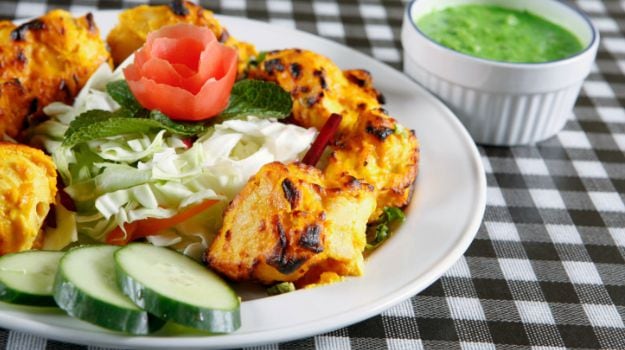Next up is the oil. It prevents the marinade from drying out and sticking to the grill. Mustard oil is a good choice for your Indian tikkas and chops. Lastly, experiment with whole spices and fresh herbs but bear in mind that the overall flavour should be clean with a focus. It should match the meat.
"Fish has a delicate flavour of its own don't ruin it with many spices. Chicken, on the other hand, is more bland so fresh herbs like mint and coriander and hot chillies team up very well. For lamb, I'd go for more fragrant spices and stronger flavours like kebab chini, cardamon or pepper," shares Chef Marut Sikka. It's not just about saucing things up but using your creative juices.Good results start in the mixing bowl. Your marinade should have a defining ingredient - this is not the time to combine balsamic vinegar, lime, wine, turmeric, garlic and whatever smells right. Chef Ravi cautions me about the right quantity of ingredients. "Since marination is an irreversible reaction you must be sure about what and how much you need. Overplaying with your ingredients can kill the original taste of meat. For continental dishes, I prefer to use only use salt, pepper, olive oil and few herbs maybe.' he says. I quite agree, when you sink into a fleshy steak you first look forward to that meaty flavor followed by a subtle undertone of spices or herbs.
(10 Best Grilled Chicken Recipes)
Rub it right
I hate being misled, especially when it comes to food and so I went around to gather some expert advice on the right way to make marinades. Mr Atif Uddin, owner of Karim's in New Delhi which is known for its kebabs and tikes shares, "Yogurt makes for a great base for marinades used in Indian dishes as it softens the meat easily. We also add spices like black pepper, red chilly powder, javitri, garam masala, cardamom, bay leaves and many more. While the recipe remains the same for all kinds of meats the duration for marination differs. Fish and chicken are marinated for about 1 to 2 hours while mutton is left overnight."
Some may argue that marinades only give surface treatment but here's a way out. "You could prick the meat or make gashes to allow all ingredients to seep through easily. Its good to use roasted gram flour or channa flour in the marinade. This acts as a binding agent and prevents the marinade from falling off. When using 1 cup of yogurt add 1 tablespoon of gram flour," advises Nita Mehta.While grilling some creamy Malai Tikkas, you'd want to add cheese and eggs to render a thick coating. You can also try using thinner cuts for more penetration. In fact, marinades are great mostly for leaner cuts. "With tougher meats like mutton you can add about a tablespoon of raw papaya paste or pineapple juice for better results. The skin of raw papaya contains an enzyme called Papain which accelerates the act of tenderizing. Your marinade should not be too dry, more custard-like consistency to allow it to get into the meat easily," says Chef Marut Sikka.
Chef Ravi suggests a two-step marination process, "At Dhaba, we follow a process in which first we first marinate with ginger-garlic paste, lime juice and salt. Lime is the acid and salts being the dehydrator draws out the moisture. It is then left for 2 to 3 hours. The first marination shouldn't be for too long. This is to flavor the meat. The next step is where we use hung curd and mustard oil and leave it for about 4 to 5 hours. This is to flavor the dish.""A crucial thing that I'd like to highlight here is that if you keep your marinated meat in the refrigerator the activity will be slow. Cold temperatures tighten up the mussel tissue and the process can take longer. You can keep it at room temperature (18 to 20 degrees), where it is not too hot or cold.," he adds. Bear in mind, warm temperatures could also promote bacterial growth so you can also decide to first marinate in the refrigerator and then bring it to room temperature before cooking.
(Coconut-Fried Chicken Recipe for a Group Supper)
Reusing would be a marination mistake. The flavors are obviously brighter and more alive if you use a marinade immediately. If you want to baste your meat while on the grill, reserve some. Use ceramic or glass vessels to keep the marinated meat, the acid in your marinade may react with utensils made of metal and taint the food.
So the secret must be marinating your meat for longer? Not quite. It's true that meat takes time to absorb the flavors but a lot of it depends on the type and ingredients used. While marinating lamb if you're using raw papaya paste, reduce your reaction time. Raw papaya paste acts quickly and can make your meat mushy if left on for too long. Mostly, mutton is left to marinate overnight or for about 8 hours. In such a case, add the papaya paste only 2 to 3 hours before you decide to cook. Fish becomes dry when marinated for too long, something between 20 minutes to 2 hours should be good. Chicken can be marinated for longer, ideally 4 to 5 hours.
Enough said. My grilling gear is calling out. Eat on.






